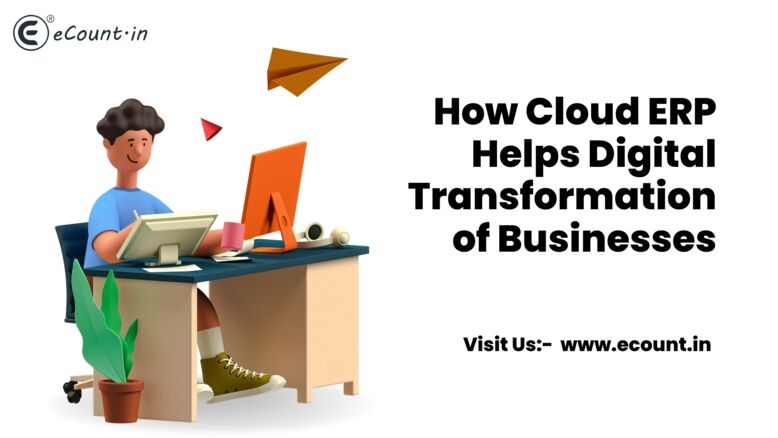How Cloud ERP Helps Digital Transformation of Businesses
10-04-2024

As we operate in the digital realm, businesses realize that they now have to evolve the way they work to thrive in the competitive market and guarantee productivity and consistent growth for their businesses.
Businesses are driven by digital transformation through the cloud ERP system. It helps to manage data in real time, facilitates paperless transactions, and facilitates well-informed decision-making. The digitalization of the business can be done through other various technologies, for instance, blockchain, machine learning, artificial intelligence, IoT, cloud computing, etc.
Innovative technologies in cloud ERP systems, with the help of the best cloud software company in India, are changing the way businesses collaborate, function, and collect insightful data. It facilitates businesses' adaptability to maintain and adopt advanced technologies that lead to innovation. But here comes a big question: what does digital transformation mean, and what does it imply for business?
In this blog, we will dig more in-depth into cloud CRM ERP and how it assists in the digital transformation of organizations.
What does Digital Transformation mean to businesses?
Digital transformation is about the process of changing the way your company functions while adopting new technologies to benefit customers and their staff. This shift is crucial as it gives companies the ability to adopt technology to navigate through routine business decisions and operations in a timely and efficient manner. However, digital transformation helps to change What should be the functions of traditional industries like manufacturing and distribution organizations.
What should you know about Cloud ERP?
A cloud ERP system is enterprise resource planning software that is hosted and maintained remotely by a provider in the cloud. The demand for cloud ERP software can be noticed from the market growth that is projected to grow from USD 45.3 billion in 2020 to USD 101.1 billion by 2025 at a CAGR of 17.4%. (Source: MarketsandMarkets)
This initiation helps businesses in different ways; it reduces a significant amount of work by taking care of the applications, data storage, underlying operating systems, servers, physical data center infrastructure, security updates, and function upgrades.
Cloud ERP is enterprise resource planning software that is easily accessible online. This software serves as the core or backbone of an organization’s IT infrastructure, offering advanced capabilities for each function of business operations.
These capabilities of cloud ERP software are equal to or better than those of on-premises solutions. Most of the downsides, such as upfront licensing costs, are absent. This happens because of the hosting offered by the ERP vendors and the profitability of businesses.
Due to several advantages, ERP systems that are cloud-based are in great demand. This is also an effect of their ability to quickly access and analyze enormous amounts of data.
A lot of costs were deducted that were previously incurred to maintain the server manually in the office from the addition of the cloud ERP system. The staff of the company can access it at any time and from anywhere, as it provides mobile access.
However, it allows cooperative access, where employees can easily get connected.
Why Do You Need an ERP System for Digital Transformation?
Companies and their workers most benefit from digital transformation, but it would not happen without cloud ERP systems. Every day, huge volumes of data get collected, and this causes a lot of problems. With the help of the ERP system, all the data gets categorized and analyzed by the ERP system to make it easy for employees to access. This solution is robust integration for businesses since it makes decisions, or at least prepares decisions, ahead of time. After that, it can react to information to continuously modify itself.
The other significant technology is machine learning, which is driven by artificial intelligence (AI). To enhance prediction and personalization, it offers a basis for comprehending current events and also can recognize problems, patterns, and future signals. Hence, it shows a wide range of technology that is needed for the success of the business.
Cloud ERP's benefits for businesses undergoing digital transformation
Following are some of the ways in which cloud ERP helps companies with the digital transformation of their businesses:
1.Increase the amount of outreach
Making your company accessible to potential clients to wherever they are and whenever they desire is the main motto of the digital transformation. You can get access to important documents by using ERP from any location. It also allows you to easily communicate and connect with the coworker while being at some other location, no matter if you are on a business trip or attending a meeting.
2.Cost Cutting
The cloud comes with a subscription-based SaaS service. The amount you pay for the cloud ERP system on a monthly basis is far less than the on-premise deployment. Also, you don’t have to spend money on expensive equipment, peripherals, or hardware.
Businesses that adopted cloud ERP experienced a cost savings of 20-25% in comparison to on-premises, all because of the reduction in infrastructure costs. (Source: Panorama Consulting Solutions). However, businesses can improve their bottom line while making little expenditure.
3.Minimizes the Responsibility
There are several duties that need to be done on-premise or in traditional ERP hosting like system upkeep, data transfer, etc. You are no longer worried about the work that requires manual effort, and you can be focused on other functions of the company. In this way, the productivity of the company will also increase.
4.Hassle-free Implementation
When new software in the company is installed, one of the significant problems that the company faces is related to its implementation. Deployment is often a tedious process that requires a longer time. However, this is not the case with the cloud ERP system, as it cuts down on the deployment timeframes.
It takes no time to choose and buy technology; there is no need to hire and train IT staff, develop new data security methods, etc. In business, the implementation of a cloud system is a much faster and less complex procedure. However, a cloud ERP system is a simple, straightforward solution that is easy to use and learn, has no drawbacks, and is swiftly adopted.
5.Security Improvements
The advantage that cloud ERP provides to businesses of any size and type is exceptional security. When it comes to the storage and retrieval of private company data, operations are always error-free thanks to this cloud ERP system. With cloud ERP, you don’t have to worry about the data being leaked by a third party during the transformation period because the system tracks all activities and completely encrypts your data.
Takeaway!
The digital transformation heads to the cloud. It offers much and keeps on supplying the best and most advanced software architecture that comprises network segmentation, data integration, and authenticity across several clouds. Because it lessens the expense of buying, installing, and implementing the software for their shop floor, manufacturers prefer cloud ERP systems.
With the help of the best cloud ERP Software for Logistics like eCount Software, you can adopt a digital transformation of the business with the help of a cloud ERP system that guarantees client satisfaction, eliminates complications in operation, and makes it simpler and faster.
Recent Post
How to Set Transportation Management Solutions to Boost Your Net Profit
12-03-2025
Effective Logistics Management With ERP Systems
24-10-2024
Manual or Automated Transport Billing Software: Make the Right Choice
15-10-2024
6 Practical Ways to Use Transport Software to Maximize Revenue
14-09-2024
Advantages and Disadvantages of Fleet Management System
17-08-2024
How Does A Transport Management System Work?
12-08-2024
The Future of Mobility: Revolutions in the Logistics Industry
29-07-2024
Optimizing Fleet: Benefits of GPS-Tracking Systems for Maximum Efficiency
26-07-2024
The Future of Fleet Management: Tech and Trends (2024)
21-07-2024
Logistics Optimization: Benefits, Tactics and Technology
21-07-2024
5 Tips For Sustainable Fleet Management Strategy in 2024
15-07-2024
Merits of Integrating Accounting with Transport Management Systems for Small Businesses
15-07-2024
Top Cloud Software Companies in India for ERP Solutions
30-06-2024
The Best Free Transport Bilty Software Options
29-06-2024
The Best Transport Software: Making Transportation Easy
28-06-2024




